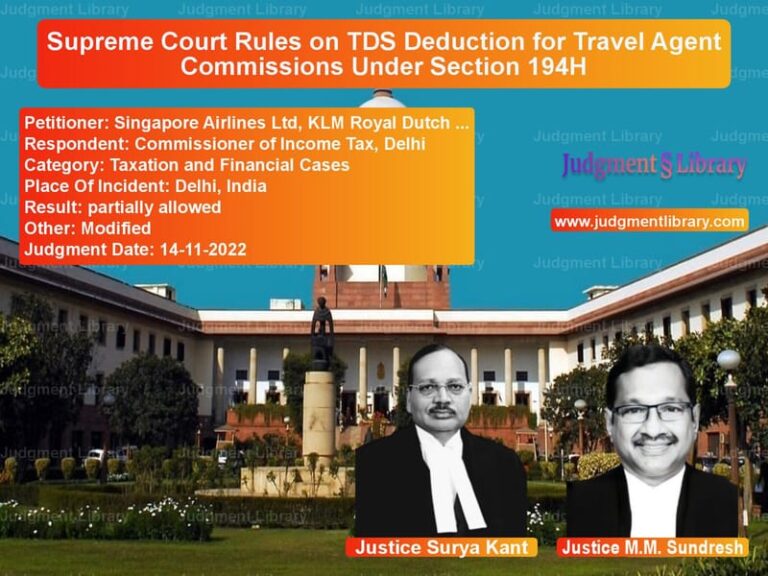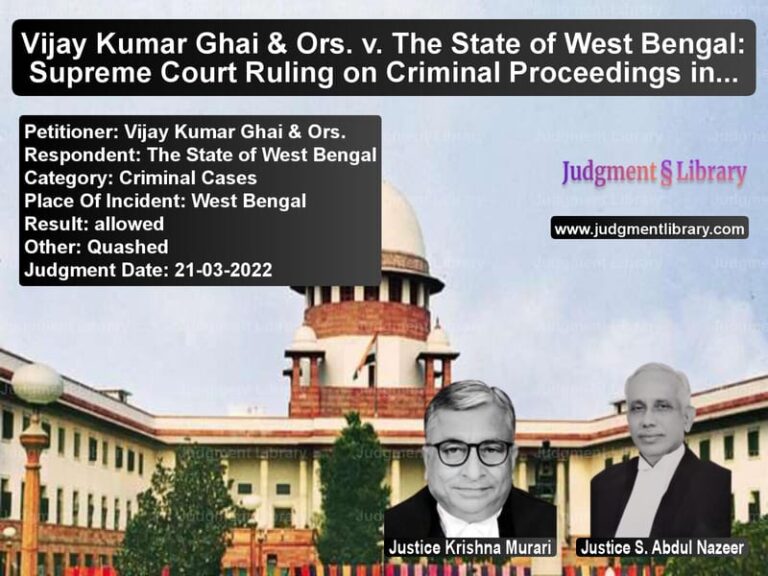SC Orders De Novo Trial in IT Act Fraud Case and Grants Bail to Accused
The Supreme Court of India, in a recent ruling, emphasized the importance of a fair trial and the right to legal representation for accused persons. The case, Ekene Godwin & Anr. vs. State of Tamil Nadu, involved allegations of fraud under Sections 419 and 420 of the Indian Penal Code (IPC) and Section 66, read with Sections 43(J) and 66D of the Information Technology (Amendment) Act, 2008. The appellants, who had been denied bail by the High Court, challenged the decision before the Supreme Court.
Delivering the judgment, Justice Abhay S. Oka noted that the Trial Court’s approach to recording witness testimonies without allowing cross-examination was legally flawed. The appellants were not represented by counsel at the time of witness examinations, and the Trial Court failed to provide them with legal aid representation, thereby violating their right to a fair trial.
Background of the Case
The appellants, Ekene Godwin and another individual, were accused of committing fraud and cheating, as per the charges framed under IPC and IT Act provisions. The case revolved around allegations that they engaged in fraudulent activities involving electronic transactions and misrepresentation.
The trial commenced before the Additional Chief Metropolitan Magistrate, Egmore, Chennai. However, a crucial procedural irregularity arose when the Trial Court recorded the examination-in-chief of twelve prosecution witnesses between July 25, 2023, and February 7, 2024, without allowing cross-examination. The appellants, at that time, did not have legal representation, which resulted in a serious miscarriage of justice.
Legal Issues Raised
The case brought forth critical legal questions regarding:
- The right of an accused to have legal representation during trial proceedings.
- Whether the Trial Court’s approach of recording witness depositions without cross-examination was legally permissible.
- The impact of procedural irregularities on the accused’s right to a fair trial.
- Whether the appellants, having been in custody since January 8, 2023, deserved bail pending trial.
Arguments Presented
Petitioners’ Arguments
- The appellants argued that their fundamental right to legal representation was violated as they had no advocate present when crucial witness depositions were recorded.
- They contended that the High Court failed to acknowledge this major procedural lapse while rejecting their bail plea.
- The appellants emphasized that their prolonged detention since January 8, 2023, amounted to unjust incarceration without the opportunity to effectively defend themselves.
- They requested bail, citing procedural lapses and asserting that their continued custody served no justifiable legal purpose.
Respondent’s Arguments
- The State of Tamil Nadu opposed the bail plea, stating that the appellants were accused of financial fraud that had serious ramifications.
- The prosecution argued that the High Court’s directive to expedite the trial justified the Trial Court’s approach in recording testimonies without cross-examination.
- They also maintained that granting bail might hamper the investigation and trial proceedings.
Supreme Court’s Observations
The Supreme Court found the approach of the Trial Court to be legally unsound. Justice Abhay S. Oka made the following critical observations:
“The Trial Court ought not to have recorded the evidence in this fashion. Before recording the examination-in-chief of the first prosecution witness, after finding that the appellants-accused had not engaged any Advocate, the Trial Court ought to have provided a legal aid Advocate to the appellants-accused so that the evidence of the prosecution witnesses could have been recorded in the presence of the Advocate representing the appellants-accused.”
The Court further noted that cross-examination of prosecution witnesses is an integral part of a fair trial. Referring to Section 138 of the Indian Evidence Act, 1872, the Court stated that the absence of cross-examination could lead to claims of prejudice.
Impact of Procedural Lapses
The Court observed that recording witness testimonies without allowing the defense to cross-examine them significantly compromised the fairness of the trial. Such procedural irregularities could result in severe prejudice against the accused.
Additionally, the Trial Court did not pass any specific order under Section 242(3) of the Code of Criminal Procedure, 1973 (CrPC), allowing the postponement of cross-examination. The Supreme Court clarified that such an approach was an exception rather than a rule and should have been properly justified.
Supreme Court’s Directions
Recognizing the injustice caused by these lapses, the Supreme Court passed the following orders:
- The appellants were to be produced before the Trial Court on March 27, 2024, at 10:30 AM for the appointment of a legal aid Advocate.
- The appellants were granted bail subject to stringent conditions, including the deposit of their passports with the Trial Court.
- The Trial Court was directed to conduct a de novo trial, re-examining prosecution witnesses 1 to 12 with proper legal representation for the accused.
- The Trial Court was instructed to ensure that all subsequent proceedings adhered strictly to fair trial principles.
Conclusion
This judgment underscores the Supreme Court’s commitment to upholding due process in criminal trials. The ruling not only granted bail to the accused but also reaffirmed the fundamental right to legal representation and a fair trial. The Supreme Court’s intervention ensured that procedural lapses by the Trial Court were rectified and that justice was not only done but seen to be done.
Petitioner Name: Ekene Godwin & Anr..Respondent Name: State of Tamil Nadu.Judgment By: Justice Abhay S. Oka, Justice Ujjal Bhuyan.Place Of Incident: Tamil Nadu.Judgment Date: 18-03-2024.
Don’t miss out on the full details! Download the complete judgment in PDF format below and gain valuable insights instantly!
Download Judgment: ekene-godwin-&-anr.-vs-state-of-tamil-nadu-supreme-court-of-india-judgment-dated-18-03-2024.pdf
Directly Download Judgment: Directly download this Judgment
See all petitions in Bail and Anticipatory Bail
See all petitions in Fraud and Forgery
See all petitions in Cyber Crimes
See all petitions in Judgment by Abhay S. Oka
See all petitions in Judgment by Ujjal Bhuyan
See all petitions in allowed
See all petitions in supreme court of India judgments March 2024
See all petitions in 2024 judgments
See all posts in Criminal Cases Category
See all allowed petitions in Criminal Cases Category
See all Dismissed petitions in Criminal Cases Category
See all partially allowed petitions in Criminal Cases Category







